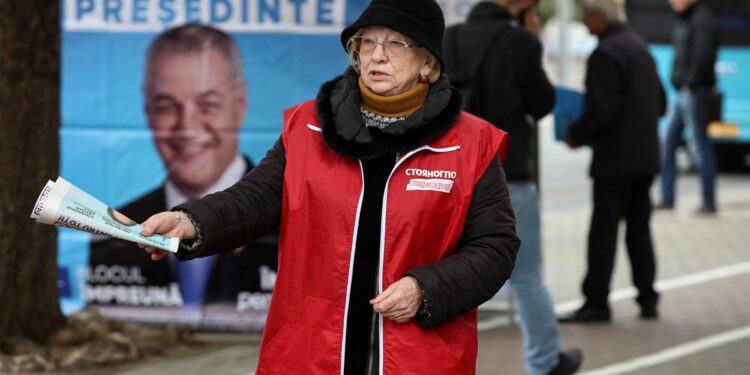Incumbent Sandu Leads Polls as Election Looms
Eleven candidates are in the ring for Moldova’s presidential election. Polls suggest incumbent, pro-European President Maia Sandu will handily win the first round of voting on 20 October. Her strongest challengers will likely be former Balti Mayor Renato Usatii, who says he will prioritize “national development” over politics, and former Prosecutor-General Alexandr Stoianoglo, who is backed by the opposition Socialist Party led by former President Igor Dodon, an advocate of strong relations with Russia. – Transitions
Key Narratives
Telegram is a case in point. At the start of the election campaign, the Independent Journalism Center (IJC) began tracking how anti-EU sentiment had been gaining a foothold on multiple Moldovan Telegram channels, many of them with audiences of tens of thousands of followers.
Its analysis found that “messages are aimed at discrediting the poll, denigrating the government and the European Union, misinforming about the possible consequences of the October 20 vote and thus discouraging citizens from decision-making.”
Among the main narratives identified on these dedicated anti-EU channels were threats that integration would mean being drawn into international conflicts.
“Where there is the EU, there is NATO,” declared one statement. “And with them come war, chaos, and death to the people.”
Then there was the supposed impact on the Moldovan economy.
“Since 2005, one third of all European farms have been closed because of EU rules,” claimed one post. “The Moldovan agricultural market will simply disappear. Protect our farmers – say NO on October 20!”
Other narratives included looming dangers to Christianity and traditional values.
“A major attack on the Metropolitan of the Orthodox Church of Moldova is planned for this fall,” read one message. “This will happen after the elections, if pro-European forces win.”
Another warned of the imminent introduction of “LGBT propaganda” which would mean the “distortion of world and national history, destruction of the historical memory of Moldovans … and this negatively affects national identity and patriotism! This is how we are losing our young generation and may lose the country!”
An earlier Telegram monitoring carried out between April and August 2024 by Expert Forum and WatchDog.MD Community revealed specific narratives focused on discrediting the constitutional referendum, including that it violated Moldovan law and was a presidential election fraud scheme with no legitimacy.
“These are old narratives, absolutely all old Russian style, but much more intensely repetitive, detailed, with new accents and previously unheard combinations – and much more present on TikTok, Facebook, and Telegram,” said Valeriu Pasa, chairman of WatchDog.MD Community. “We have seen how the same Telegram channels now have three to four times as many manipulative posts about the EU compared to the same period of time a year ago.”
Until recently, Moldovan TV channels often broadcast programs directly from Russia, so this content has long been part of many citizens’ informational space.
Likely Effects
The key factor in validating the referendum is voter turnout, which must reach at least one-third of the electorate. In this context, the narratives spread on social networks could play a crucial role.
“Polls show that about a third of respondents do not intend to participate in the referendum,” said Mihai Mogildea, deputy director of the Institute for European Policies and Reforms (IPRE). “Given that the turnout rate in the first round of the 2020 presidential elections was 48 percent, if a third of this electorate does not participate in the referendum, the risk of invalidating it is real. […] What is certain is that, through the huge amount of money invested in promoting these narratives online, Russian-affiliated propagandists can reach the vast majority of the voters.”
Pasa emphasized that polls indicated that while 63 percent of Moldovans said they support EU membership, only 54 percent said they would actually go to the polls and vote yes.
“That means that disinformation and propaganda not only makes some citizens against EU membership, but even persuades some of those who want European integration not to do one basic thing: to vote pro. We know that there will be a majority at the referendum, but even with 30 percent of the citizens against, the situation is sad,” he continued, adding, “Let’s not be complacent if the referendum passes. Russia will never give up its attempts to control Moldova. Nor will propaganda and manipulation disappear.”
Experts agree that the fundamental solution to disinformation [is] providing education and media literacy.
Mogildea added that a short-term solution could be to combat these narratives through communication campaigns involving the authorities, opinion leaders, and the media.
“In addition, the authorities need to work more actively on identifying and punishing those violating laws, especially on the provisions related to information security, illicit financing, and treason,” he said.
Pasa emphasized the importance of a strong independent press.
“We cannot have national television with [only] a few reporters, without qualified producers, without well-paid and professional editors, without robust editorial policies, and expect the press to fully realize its mission to bring the truth on complex issues into every home,” he continued.
As for strategic communication, he said that the state as an institution needed to promote its own narratives “based on truth and democratic values.”
“We need a lot of topics that generate a broad consensus in society – about the past and the present, about what is definitely good and what is definitely bad for the Republic of Moldova.”
…
Victoria Dodon is editor-in-chief, Independent Journalism Center Moldova. This article originally appeared in the Institute for War & Peace Reporting (IWPR) and is republished by permission.
Source link : https://tol.org/client/article/moldova-how-social-networks-amplify-anti-eu-narratives.html
Author :
Publish date : 2024-10-17 13:52:00
Copyright for syndicated content belongs to the linked Source.


